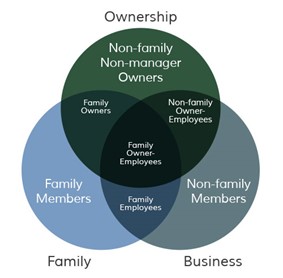Many people view family businesses as complex and somewhat messy. However, if viewed with the right framework, the complexities can be navigated much more easily.
 Source: johndavis.com
Source: johndavis.com
Family business three-circle framework
The primary framework through which to view family businesses is called the “three circle model” showing that family businesses are made up of three different systems that interact with each other: family, business, and ownership.
In this model, someone may be part of all three circles (i.e. the founder) or just one (i.e. a family member who is not part of the business). By understanding your position within the model, family business members can see the competing needs and perspectives of each sub-system and better understand how to respond.
The systems
These systems can be fairly complex on their own (think about your own family system), but complexity increases even more when the three interact, so it is important to have a clear understanding of each system.
The Family system includes whoever is defined as part of the family. Topics of discussion for this group include legacy, values, and connection. The authority of this system is hierarchical based on family roles.
The Business system includes those who work in the business. Topics of discussion for this group include management issues for the company. The authority of this system is related to their role as an employee (CEO vs. administrative assistant).
The Ownership system includes the owners of the company. Topics of discussion include growth, return, risk, capital, and liquidity. The authority of this system is based on percentage of ownership.
How the framework helps family businesses
Most family business issues can be traced back to a confusion of roles between systems or a lack of communication within a system. A classic example is that of a next generation son or daughter taking over the family business without any relevant experience or capability. This mistake is due to making a Family decision regarding legacy versus a Business decision where management issues are to be discussed and determined.
To deal with the complexity, first understand what hat(s) you wear in your family business, and make sure you are wearing the right hat in the right situation. Create structures for regular communication about important topics in each of the three circles. This can be done through family meetings for the Family system, management meetings for the Business system, and shareholder meetings for the Ownership system. Also, provide for governance in each circle by having a family council and/or family policies for the Family system, a management team with role clarity for the Business system, and a board of directors and shareholder agreements for the Ownership system.
The competing tensions of the different systems make working in a family business more complex, but that complexity can also make life richer and the business stronger if dealt with properly.